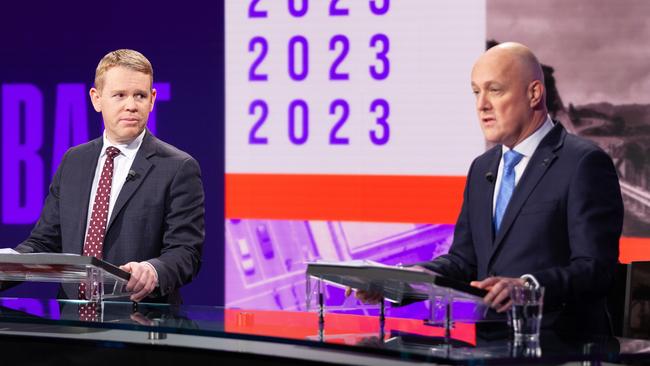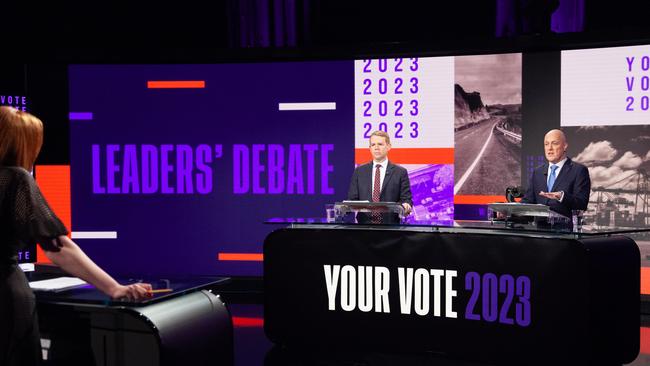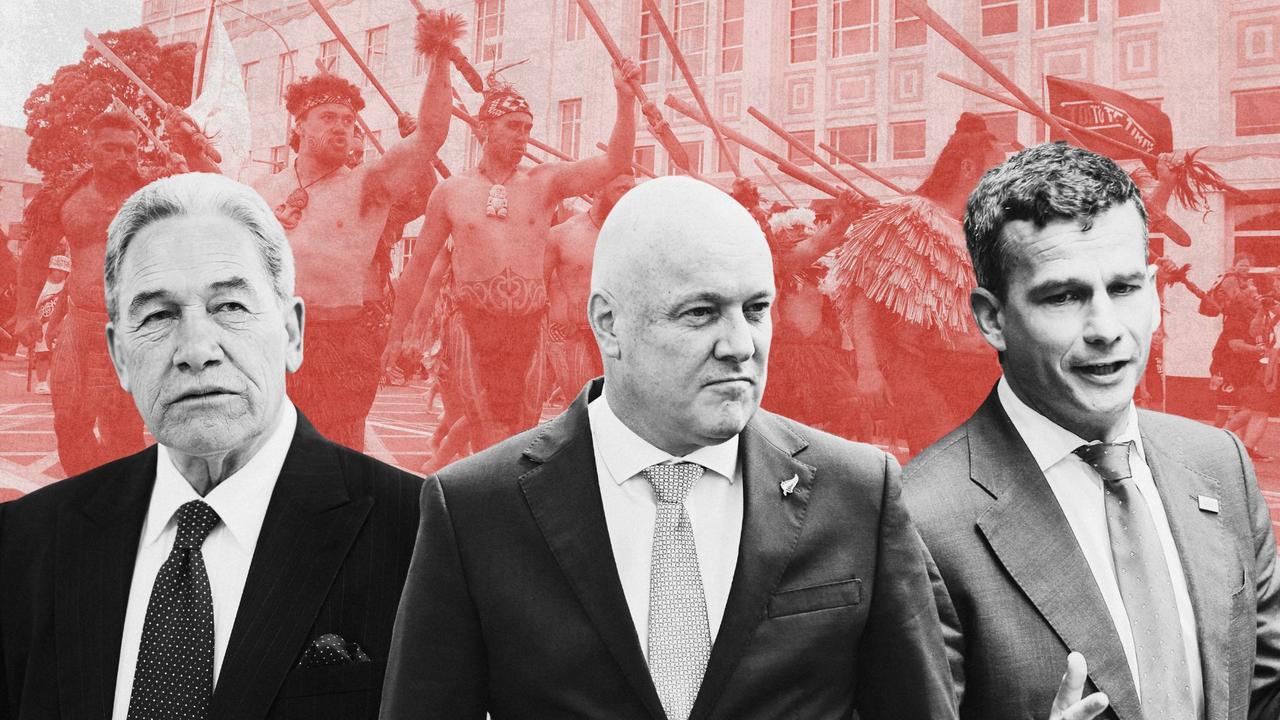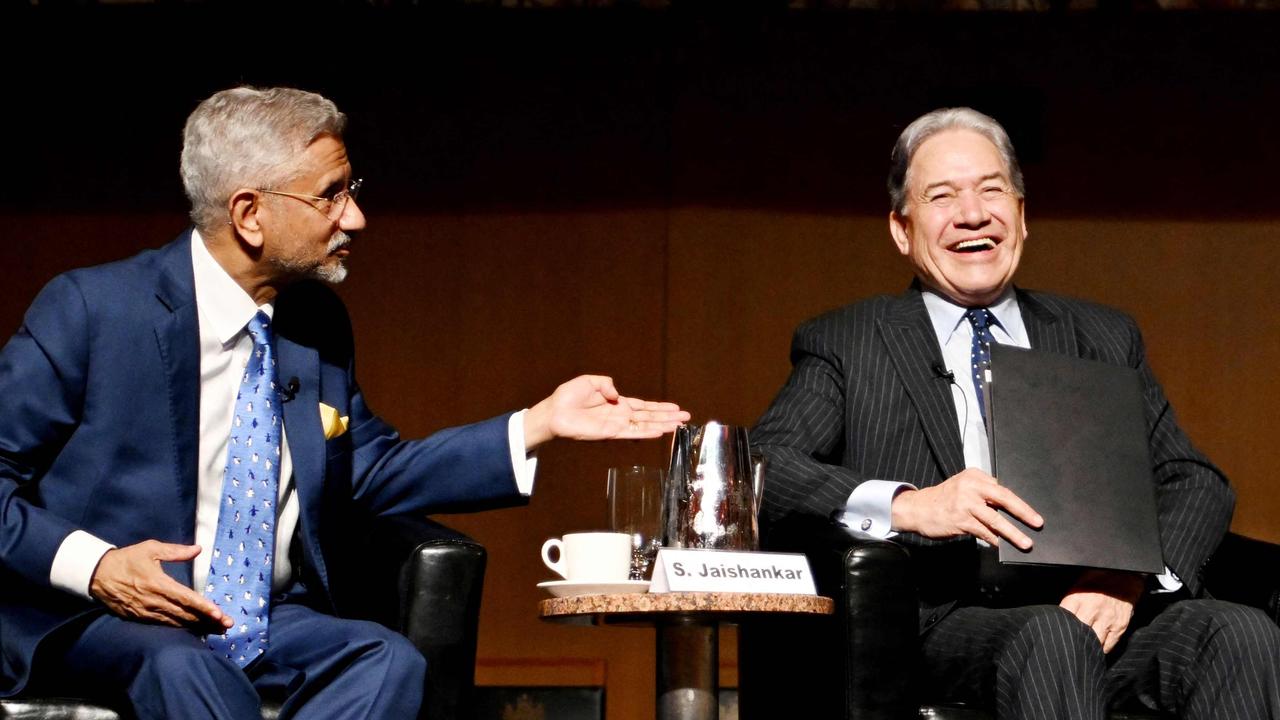New Zealand leaders spar on crime and health but agree on no nuclear ships
Chris Hipkins and Christopher Luxon could agree NZ will keep its nuclear-free policy regardless of who wins the election but threw punches over almost every other issue.

Regardless of who wins the New Zealand election, there will be no move to a republic any time soon, and the country’s nearly 40-year ban on nuclear-powered ships will continue.
In a combative first leaders’ debate, Labour Prime Minister Chris Hipkins and rival National leader Christopher Luxon could agree on these points at least.
They also agreed a bipartisan approach to China, although chiding the debate moderator that it was “unhelpful” to discuss a hypothetical situation in which China, NZ’s largest trading partner, might invade Taiwan.
Asked about the potential of an invasion, Mr Hipkins could reply only that “every diplomatic effort” would be put in play to combat it. Mr Luxon, who has repeatedly refused to discuss his party’s policy on defence, stressed a bipartisan approach on the issue; an indication that New Zealand’s cautious foreign policy would not soften under his watch.
“I’m with Chris,” he said.
The debate, held just over four weeks from the October 14 election, saw the veteran Mr Hipkins go head to head with first-term MP Mr Luxon and (if you believe the polls) the next PM.
From the start the debate was Mr Luxon’s to lose. National has been polling well ahead of Labour over the past few months – the most recent polls has National around the 40 per cent mark, against Labour still hovering in the mid-to-high 20s – and Mr Luxon has finally caught up with Mr Hipkins in the preferred prime minister stakes, with both at 23 per cent.
Mr Luxon has reportedly been prepping hard with his team and it showed. To be fair, so little was expected of Mr Luxon he just had to survive without making a monstrous error to be in with a chance of winning. But in the end he gave as good as he got in what turned into a verbal boxing match.
Mr Hipkins is known to love a scrap in parliament and he immediately dived right in, attacking his rival’s tax policies within minutes of the debate opening. Mr Luxon gave as good as he got, with both leaders continually interrupting and speaking over each other.
Mr Hipkins threw his first punch at National’s controversial foreign buyers’ tax of 15 per cent on properties over $2 million to help pay for $NZ15 billion of tax cuts for landlords and middle-income earners; a policy which economists dispute. He accused Mr Luxon and his party of “marketing and spin” over the policy; but a well-prepared Mr Luxon turned the guns back on his rival, mocking Labor’s plan to take GST off fruit and vegetables – a plan that economists says would save households only around $4 a week.
When Mr Luxon defended his foreign buyers tax but refused, as he has repeatedly, to explain the modelling behind the policy, Mr Hipkins came back at him, saying National would not release the numbers because they “don’t add up”.
But as they sparred over the issues at the forefront of New Zealanders’ lives: health, crime and co-governance – a sharing of governance between government and Maori – Mr Luxon appeared to take the lead.

Mr Luxon won the fight on crime with his “hard-on-crime” policies that included boot camps for young offenders and harder sentencing for gangs, but his strongest line was his simplest: “I have walked through downtown Auckland late at night and I do not feel safe.”
But Mr Hipkins forced his way back to the top of the debate on NZ’s creaking health system, particularly over whether the health of Maori and Pasifika, who die seven to 10 years earlier than the non-Maori population, should be prioritised in doctors’ appointments and surgery (as is happening in Auckland).
Mr Luxon said healthcare should be based on need, not ethnicity, and Mr Hipkins talked over him to point out that Pacific people and Maori often wait longer than others for the same treatment. “Maori have been discriminated against by the health system, and others are using that for race-based politics,” he said.
He returned to the worse outcomes for Maori when they debated co-governance – shared governance with Maori in the form of powerful Iwi (tribes), which has parallels with the debate over the Indigenous voice. Mr Luxon supports it at a local but not national level, while Mr Hipkins was adamant it improved outcomes for Maori.
“We are strongest as a country when we’re working together,” he said.
They also both agreed there was a climate crisis but Mr Hipkins accused his rival of wanting to push back decisions on emissions until the next decade.
There were moments of relief amid the arguing: both leaders spoke of how they admired the other – Mr Luxon admires Mr Hipkins for taking on the role of PM after his predecessor Jacinda Ardern stood down while Mr Hipkins admires Mr Luxon’s commitment to his family.
Most tellingly, when it came to quick-fire questions, they agreed on almost everything – from bilingual road signs (yes) to changing NZ’s name to Aotearoa (not a great idea).
If anything, it was the quick-fire questions that told voters how close to the centre the leaders’ views are. With support falling away from the mainstream parties, voters could well turn to the smaller, more radical parties to find their voice.



